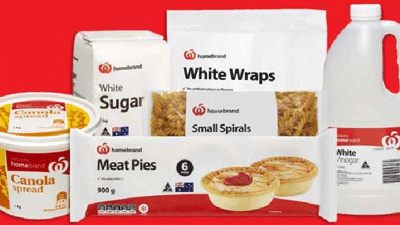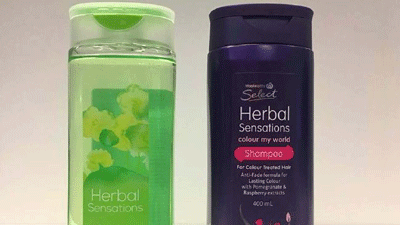Home brands - going but not quite
- Jul 31, 2017
- 5 min read
"the way human brains work is totally suggestible. When we eat or drink a food, a lot of the sensation actually comes from the packet."
News.com.au
This post was inspired by an article in the AFR about Woolworths decision to abandon its Select label in favour of 'phantom' branding. So I thought I would write something perfunctory about 'home-brand' labels in general - and indeed that's sort of what I'm going to do, but, of course, I found a whole lot of interesting stuff about brands along the way.
Woolworths, in the words of my husband, 'has lost its way' in recent times. I'm not really sure why. A combination of factors I guess - change of CEO, the arrival of Aldi and the resurgence of Coles since being bought by Wesfarmers are, I suppose the main factors. But that is not really what I am talking about today, other than to note that as part of its efforts under their new CEO to regain their status they first decided to abandon their Homebrand label and now, it seems they are also abandoning their Select label - with Woolworths Gold shortly to be changed to Gold. In other words Woolworths as a name is being abandoned. Which begs the question as to why the name of Woolworths is so uncommercial. Are they ashamed of it? It certainly doesn't inspire confidence.
I'm really not sure how long private labels have been around - that is products with the name of the supermarket on it rather than another company - implying that the supermarket also makes these things - which of course they don't. They are most likely made by some of the same 'commercial' brands found on the same shelves, but manufactured for or maybe even just supplied at a lower price. I don't know whether any of them are actually exactly the same product. Coles apparently has at least seven levels of branding from Good Buys to Coles' Finest but is planning to consolidate them - not abandon the idea altogether. I don't remember 'home brands' from my childhood but I wouldn't have noticed such stuff then. I do know that there were a lot of different brands from different sources though. In Australia apparently the first 'home brand' aimed at the money conscious was the Franklins (remember Franklins?) No Frills brand. Coles and Woolworth soon followed, because it was very successful - people wanted cheap.
These first home brands were squarely aimed at people wanting to save money. The packaging was deliberately plain - as the Woolworths Home Brand and Coles Smart Buy items still are. Interestingly they are basically both red and white, though I swear that one of them used to be blue and white. In times gone by there were absolutely no pictures on these products, but now there occasionally are - they obviously felt the need to tempt people to buy for the product itself not just the price. But surely most of us who buy these bottom of the range items (always found on the bottom shelf) are buying them because we think they are basic items whose quality does not vary from the commercial brands. Apparently chefs, for example, buy home brand flour and oil and nurses buy home brand paracetamol. Not sure about the chefs - they do go on about using only the finest products after all - but anyway... I certainly buy home brand products for things like flour, sugar, milk, washing up liquid, tinned tomatoes. I think initially there was probably a sort of reverse snobbery going on - it was sort of clever to buy them. And this idea held for many, many years. Now apparently the reverse is true. Whether the product is any good or not the quality is perceived not to be because of the branding and the packaging. Cheap now equals poor quality.

So Woolworths is going to rebrand this bottom rung of Home Brand to Essentials which label it had previously used for non-food things like napkins and glasses. What difference is this going to make I wonder if the design of the packaging is going to be much the same? The Essentials range of packaging is very similar to the Home Brand packaging after all. I suppose it gets rid of yet another label but I can't see that it will do much else. I guess it looks slightly classier - but only a touch. I did read that Coles is moving to consolidate all its private labels into just Coles, but I haven't seen a lot of evidence of this as yet.
Aldi is, of course, the big game changer in all of this. Virtually everything it sells is a private label/home brand thing. They just all have different names. And most importantly they look much like a major commercial brand. It's all very sneaky but very popular as their success in Australia has shown.
So what is Woolworths going to do with their Select range? They are going to do the same thing. Relabel them with new names ('phantom branding') that have nothing to do with Woolworths. You'll have to search the small print in the labelling on the back to find that. Imitation (of Aldi) is the sincerest form of flattery after all - or is it admitting defeat?. Here are a few of their new 'phantom brands' that have already appeared.

Aldi has been very clever. Although they are sailing very close to the wind with some of the packaging I would think. Initially we may have been conned into thinking their brands were all quality German brands - though, of course, if stupid people like me had thought about it the names on the labels were English, even Australian, sounding, not German. German is associated with quality so a German store was likely to have quality stuff. And indeed they do. Lots of their stuff is very good. Their orange juice has become our favourite for example. But I notice from the ad above that they have also started to emphasise the Australianness of their range. As for Woolworths surely introducing 'phantom branding' is a mistake. With Aldi you know that all of those brands - the ones you don't recognise from elsewhere - are all Aldi home brands. At Woolworths you will no longer know - unless you hunt through the small print. Surely this is not going to help?
And what about the top of the home brand range - Woolworths Gold and Coles Finest? Woolworths is also going to drop its name from this range, though they will keep the Gold. To me this smacks of a complete lack of confidence in the name of the company. I do not know whether Coles is going to keep theirs. But both of them might take a look at the English supermarket scene where the private label reigns supreme and has a much higher quality aura about it. Apparently 50-60% of the items in the English supermarkets are private label things. And pretty classy they are. Here are a couple of examples from England - the very classy looking ones in the different containers are Tesco which is not known for class - and below are Woolworths' and Coles' current top of the range labelling.
I think there is mileage to be made from 'classy' labels. They are generally cheaper than the commercial equivalent but are quality products - some of them have won awards. It certainly appeals to my baser snobby and canny instincts. Reverse snobbery again. I am very willing to admit that I am a sucker for classy labelling and packaging. If the labelling looks expensive I sort of think it will automatically be a classier product. If I thought about it I would realise that there is not necessarily any connection between the two but we're all human it seems.
The commercial brands are disappearing alas. Or is it alas? Somebody has to make all this 'home brand' stuff. I guess the trick is to keep making the same amount of money from a contract to a big supermarket, which is probably extremely difficult. I'll leave you with a range of baked beans.
Which ones would you choose? And why?










































Comments